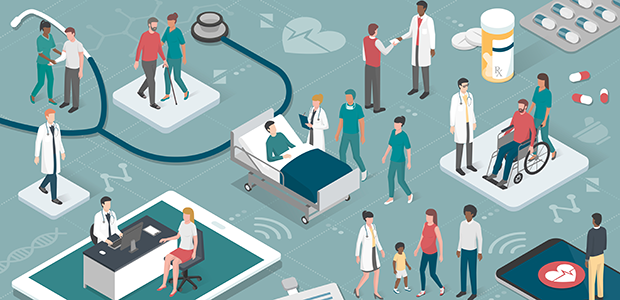
COVID-19 allows healthtech industry to demonstrate resilience
The UK is a key driver in the rapid growth of the global healthcare industry.
Global healthtech startups have had £38.5bn injected into them in 2021, a 280% increase since 2016. This growth is largely due to the COVID-19 pandemic, acting as a catalyst to an already growing sector. Laura Citron, CEO at London and Partners said: “COVID-19 has accelerated the use of tech and innovation to address human disease and health.”
The industry is booming, but also under huge pressure within all aspects due to the pandemic. Has this challenge offered greater opportunity to the industry?
I explore various positive innovative developments within the industry, speaking with Dr Murray Ellender, Practicing GP and CEO of eConsult, a platform offering digital triage and remote consultation solutions.
Resilience within the industry
It is no secret that technologies are reshaping the industry. Being at the forefront of the response to COVID-19, it has benefited from a surge of accelerated innovation and redefined practices.
Dr Murray said: “Whilst the pressure remains, the NHS has shown resilience, and has been quick to embrace digitisation across every touch point. We’re seeing more hunger for innovative solutions to these very real-life problems the sector is facing.”
The shift to smart hospitals
COVID-19 has accelerated the shift to smart hospitals. More and more hospitals are employing technologies such as AI, robotics, and location technology to create an ‘infrastructure of interconnected assets’. This enables better patient care, operation efficiency and flexibility.
The availability and use of such systems and devices lead to an overall intelligence, primarily based on IoT. Therefore, hospitals that employ these technologies successfully are considered smart hospitals, and have the potential to cut national healthcare expenditure by over 10%.
Advances in sensor and digital technology
Portable or wearable monitoring devices are being used within healthcare, improving patient outcomes, and reducing pressure on the strained healthcare facilities.
Sensor innovation has enabled vital signs to be measured at home, eradicating the need to send samples to a laboratory, producing more rapid results for a faster diagnosis. Patients can have their vital signs monitored continuously by using wearable devices. The technology can also be used in local facilities such as GP surgeries.
Remote consultation solutions
COVID-19 has allowed remote consultation services to thrive due to face-to-face appointments not taking place.
Dr Murray commented: “We’ve actually seen a huge uptake in our digital triage product offering here at eConsult. In fact, most recently, we hit 20 million eConsults.
“We’re proud that we’ve been able to support both practice and patient with our digital triage platform to improve patient outcomes and drive efficiency through the system.
“Throughout the course of the pandemic, we’ve worked with GP practices to support data collection at the triage stage - in place of the currently unfair phone call lottery system – to empower healthcare professionals with the key information on the patient’s symptoms before they see them.
“This enables them to quickly identify patient need, fast-track the route to care for patients with potentially life-threatening conditions, reduce waiting times, save practice hours and support a better delivery of care.”
Future innovation
The pandemic has shown just how resilient the industry can be, adapting to the enormous challenges it has had thrown at it.
Going forward, Murray explained that 2022 is likely to offer many challenges to the healthcare sector due to having to battle new variants of COVID-19. “The NHS will continue to face unprecedented levels of demand as a result of the pandemic, and this will outstrip capacity,” he said.
Due to surgery wait lists expected to grow, limited space for A&E patients and crowded hospital wards, the already stretched NHS services are expected to see further backlog, suggested Murray.
He added: “Innovation is the way forward if we’re to ensure that we improve clinical outcomes and sustain the future of the NHS. There’s still a long way to go.
“COVID-19 has been proof that we need to be able to adopt technology at a speed that helps us to improve efficiencies, as opposed to going through lengthy procurement processes that often slow down the pace of innovation.”

